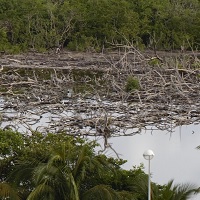- Détails
L'un des scientifiques de l'OHM Littoral Caraïbe est cité dans un très bel article sur les diatomées réalisé par Florence Rosier et publié dans Le Monde.
- Détails
Rapinski M., Raymond R., Davy D., Bedell J.-P., Ka A., Lubszynski J., Lopez P. J., Da Silva E. F., El Deghel N., Macia E., and Duboz P. (2025).
Associations between dietary diversity and self-rated health in a transverse study of four local food systems (French Guiana, Guadeloupe, Portugal and Senegal).
BMC Public Health, 25(1):823.
Lien: https://doi.org/10.1186/s12889-025-21872-8
- Détails
Duthoo, E., Delroisse, J., Maldonado, B., Sinot, F., Mascolo, C., Wattiez, R., Lopez, P.J., Van de Weerdt, C., Harrington, M.J. and Flammang, P. (2024)
Abundance, diversity and evolution of tyrosinase enzymes involved in the adhesive systems of mussels and tubeworms.
iScience. Vol. 27, N° 12, 111443
Lien: https://doi.org/10.1016/j.isci.2024.111443
- Détails
Très fier d'être l'un des co-auteurs d'un article décrivant des génomes de macroalgues de la lignée brunes
Lien: https://www.sciencedirect.com/science/article/pii/S0092867424012728
- Détails









